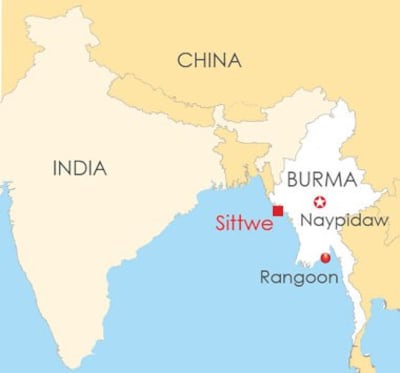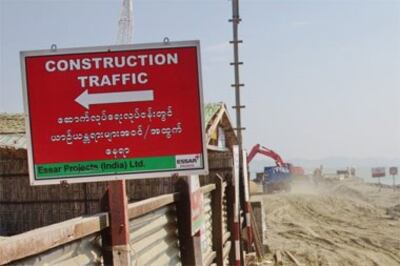SITTWE, Burma—The earthmovers are busy clawing and scraping at the Sittwe waterfront, creating piles of sand jutting out into the Andaman Sea.
“No pictures, no pictures,” a young man in a hardhat says.
Yet what is happening here is no secret. This is the beginning of a U.S. $136 million project, financed by India, to provide Burma with a new port and two jetties close to its western border with Bangladesh. The project is scheduled for completion in 2013.
Chain-link fences surround the site. Red signs at the two gates identify the contractor as Essar Projects (India) Ltd. Essar calls itself India’s leading engineering, procurement and construction company.
This is more than just a port for Burma, however. It gives India a foothold in Burma and a counterbalance to China’s planned natural gas and oil pipelines from Sittwe across Burma to its own Yunnan province.

India has a long way to go to catch up with the inroads China made in Burma by embracing the former military dictatorship. But now that a nominally civilian government is in place in Burma, India is about to play a more important role in the Southeast Asian nation’s development.
“China has exploited the isolation (of Burma) to such an extent they (the Burmese government) are now keen for a rapprochement with India or others out of a desire to diversify their foreign relations,” said Shyam Saran, India’s former ambassador to Burma.
Two weeks after the new Burmese president, Thein Sein, rebuffed China by suspending work on its $3.6 billion Myitsone dam on the upper Irrawaddy River, he headed to a summit meeting in New Delhi with the Indian prime minister, Manmohan Singh.

The Essar website says this project is of national importance to India because it includes an inland water passage and highway that will link Sittwe to the landlocked northeast Indian state of Mizoram to the north.
The Indian plan is to ship goods from Calcutta to Sittwe for transshipment through Myanmar to Mizoram. It is a shorter and less expensive route than to ship goods by road through India.
Officially, the Indian government says there’s no animosity toward China in India’s courtship of Burma.
“We have an important relationship with Myanmar (Burma),” said India’s external affairs ministry spokesman, Vishnu Prakash. “And we have an important relationship with China. There is no competition.”
But commentators see Burma’s new interest in India as a declaration of independence from China.
“China’s privileged place in the hierarchy of Burma’s foreign relations…can no longer be taken for granted,” wrote Ian Storey of the Jamestown foundation, a Washington think tank.
Tyler Chapman is a regular contributor to RFA.
